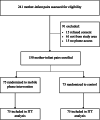Efficacy of Mobile phone use on adherence to Nevirapine prophylaxis and retention in care among the HIV-exposed infants in prevention of mother to child transmission of HIV: a randomized controlled trial
- PMID: 33879118
- PMCID: PMC8056659
- DOI: 10.1186/s12887-021-02660-w
Efficacy of Mobile phone use on adherence to Nevirapine prophylaxis and retention in care among the HIV-exposed infants in prevention of mother to child transmission of HIV: a randomized controlled trial
Abstract
Background: HIV is a major contributor to infant mortality. A significant gap remains between the uptake of infant and maternal antiretroviral regimens and only a minority of HIV-exposed infants receives prophylaxis and safe infant feeding. Losses to follow-up of HIV-exposed infants are associated with shortcomings of facility-based PMTCT models with weak community support of linkages. Use of mobile phones offers an opportunity for improving care and promoting retention assessed by timely attendance of scheduled appointments for the mother-baby pairs and achievement of an HIV-free generation. The objective of this study was to compare self-reported adherence to infant Nevirapine (NVP) prophylaxis and retention in care assessed by timely attendance of scheduled appointments over 10 weeks in HIV exposed infants randomized to 2-weekly mobile phone calls (intervention) versus no phone calls (control).
Methods: In this open label randomized controlled study, one hundred and fifty HIV infected women drawn from 3 health facilities in Western Kenya and their infants were randomly assigned to receive either phone-based reminders on PMTCT messages or standard health care messages (no calls) within 24 h of delivery. Women in the intervention arm continued to receive fortnightly phone calls. At 6- and 10-weeks following randomization we collected data on infant adherence to Nevirapine, mode of infant feeding, early HIV testing and retention in care in both study arms. All analyses were intention to treat.
Results: At 6 weeks follow-up, 90.7% (n = 68) of participants receiving phone calls reported adherence to infant NVP prophylaxis, compared with 72% (n = 54) of participants in the control group (p = 0.005). Participants in the intervention arm were also significantly more likely to remain in care than participants in the control group [78.7% (n = 59) vs. 58.7% (n = 44), p = 0.009 at 6 weeks and 69.3% (n = 52) vs. 37.3% (n = 28), p < 0.001 at 10 weeks].
Conclusions: These results suggest that phone calls are potentially an important tool to improve adherence to infant NVP prophylaxis and retention in care for HIV-exposed infants.
Trial registration: PACTR202007654729602. Registered 6 June 2018 - Retrospectively registered, https://pactr.samrc.ac.za/TrialDisplay.aspx?TrialID=3449.
Keywords: HIV-exposed infants; Mobile phone use; Nevirapine prophylaxis; PMTCT; Prevention of mother to child transmission.
Conflict of interest statement
The authors declare that they have no competing interests.
Figures
References
-
- Towards Universal access: scaling up priority HIV/AIDS interventions in the health sector. Progress report 2010. https://www.who.int/hiv/pub/2010progressreport/en/.
-
- UNAIDS data 2018. https://www.unaids.org/en/resources/documents/2018/unaids-data-2018.
-
- Kenya AIDS indicator survey 2012: KAIS final report. https://stacks.cdc.gov/view/cdc/26189. - PubMed
-
- Lester RT, Ritvo P, Mills EJ, Kariri A, Karanja S, Chung MH, et al. Effects of a mobile phone short message service on antiretroviral treatment adherence in Kenya (WelTel Kenya1): a randomised trial. Lancet. 2010;376(9755):1838-45. - PubMed
-
- Shet A, Arumugam K, Rodrigues R, Rajagopalan N, Shubha K, Raj T, D'souza G, De Costa A. Designing a mobile phone-based intervention to promote adherence to antiretroviral therapy in South India. AIDS Behav. 2010;14(3):716-20. - PubMed
Publication types
MeSH terms
Substances
LinkOut - more resources
Full Text Sources
Other Literature Sources
Medical
Miscellaneous




